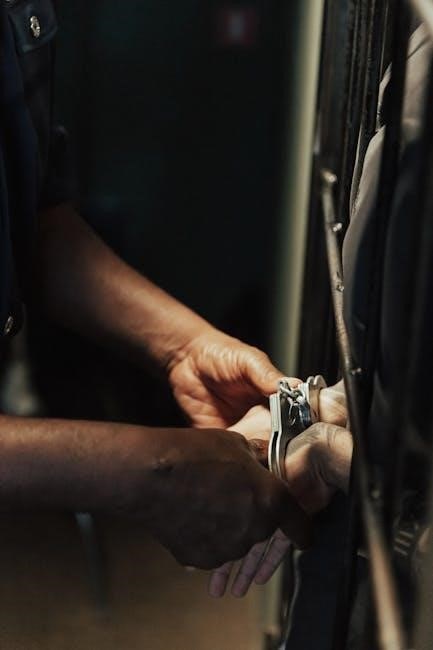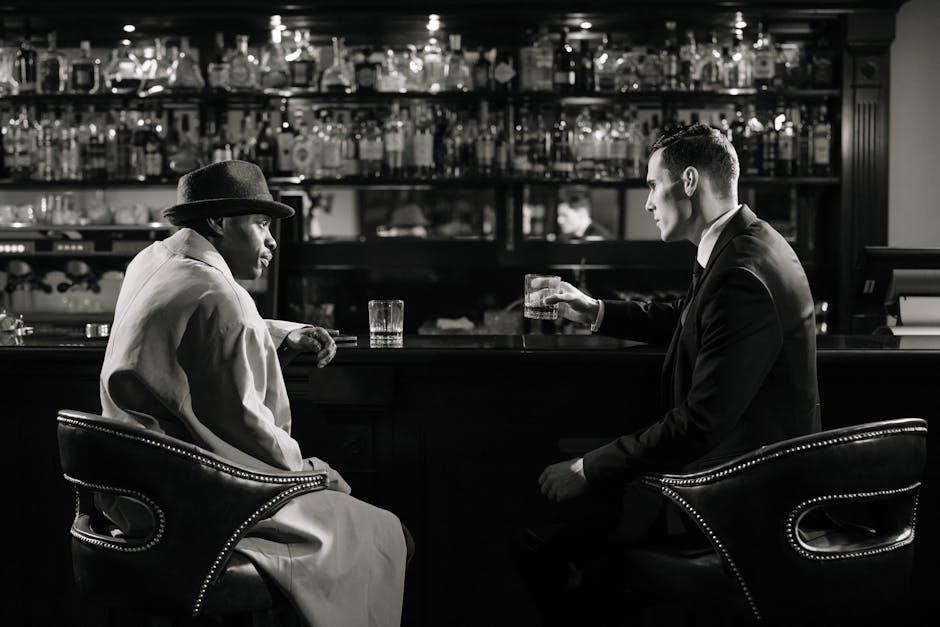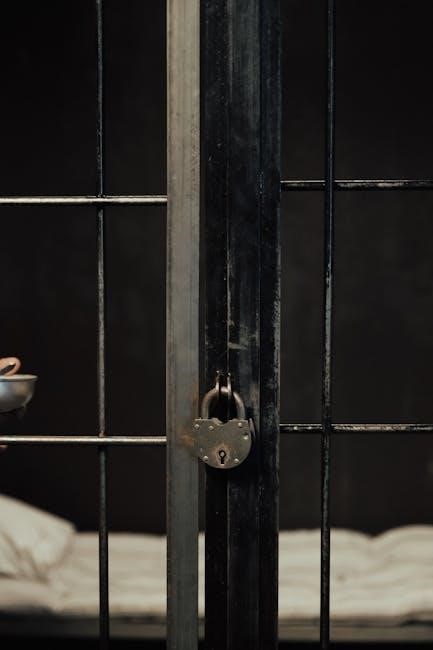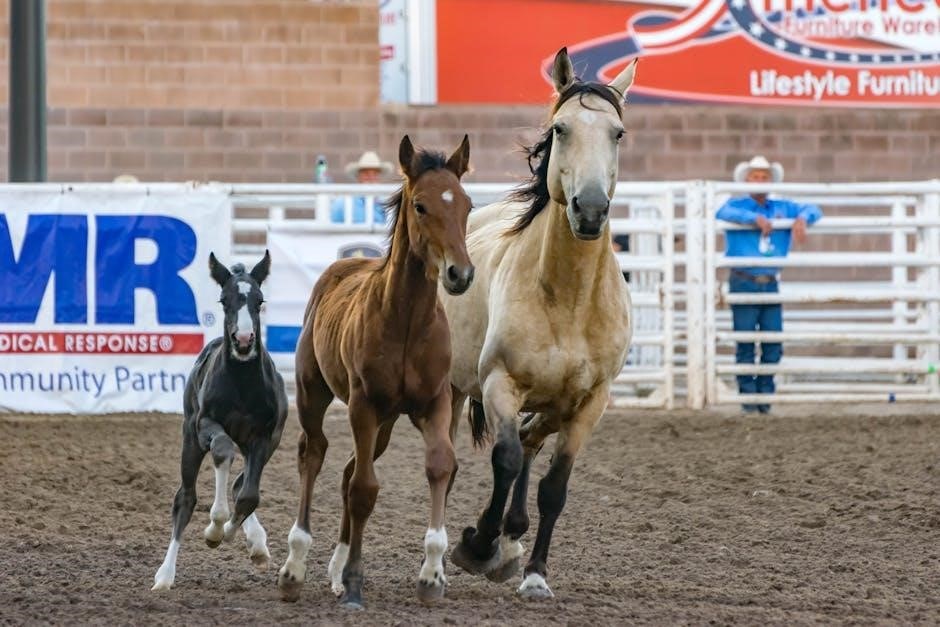
The Colorado Criminal Jury Instructions provide standardized guidance for juries‚ ensuring clarity and consistency in understanding legal principles and applying them to criminal cases effectively.
1.1 Purpose and Importance of Jury Instructions
Jury instructions are critical in criminal trials as they guide jurors on the law applicable to the case‚ ensuring they understand legal standards and principles. Their purpose is to provide clear‚ consistent‚ and accurate explanations of the law‚ enabling jurors to apply it fairly to the evidence presented. Proper instructions help prevent misunderstandings and ensure the jury’s decision aligns with legal requirements. They also safeguard the defendant’s rights by clearly outlining the burden of proof and elements of crimes. Without precise instructions‚ trials risk inconsistency‚ bias‚ or legal errors. Judges and attorneys collaborate to draft instructions‚ ensuring they are tailored to the case while adhering to legal precedents and rules.

1.2 Overview of Colorado Criminal Jury Instructions
Colorado Criminal Jury Instructions are standardized guidelines established by the Colorado Supreme Court Committee to ensure uniformity in criminal trials. These instructions cover essential legal definitions‚ elements of crimes‚ and procedural requirements‚ providing a clear framework for juries to follow. Regular updates reflect changes in statutes and case law‚ ensuring relevance and accuracy. The instructions address various offenses‚ from homicide to drug-related crimes‚ offering specific guidance tailored to each case type. While they serve as a foundational resource‚ they are not binding law but rather a tool to help jurors apply the law correctly. This system aims to enhance consistency and fairness in criminal proceedings across the state.
1.3 Legal Standards and Requirements
Colorado Criminal Jury Instructions must adhere to strict legal standards‚ ensuring accuracy‚ clarity‚ and compliance with state and federal laws. The instructions are drafted by the Colorado Supreme Court Committee‚ which reviews and updates them annually to reflect changes in statutes and legal precedents. These guidelines are designed to avoid ambiguity and prevent misleading the jury. They must align with due process requirements‚ avoiding any language that could be deemed unconstitutional or biased. Properly crafted instructions are essential to safeguard defendants’ rights and ensure fair trials. Non-compliance with these standards can lead to reversible error‚ emphasizing the critical role of precise and lawful jury instructions in maintaining judicial integrity.

Understanding the Role of Jury Instructions in Criminal Trials
Jury instructions guide jurors on applicable laws‚ ensuring they understand legal standards to apply evidence correctly and reach a fair verdict based on the law presented.
2.1 The Role of Judges in Drafting Instructions
Judges play a critical role in drafting jury instructions‚ ensuring they accurately reflect the law and are tailored to the specific case. They collaborate with legal experts to review and update model instructions annually‚ as seen in Colorado’s 2024 model jury instructions. Judges must balance legal precision with clarity‚ avoiding overly complex language. Their responsibility includes finalizing instructions after considering input from both prosecution and defense‚ ensuring fairness and adherence to legal standards. This process is supported by committees‚ such as the Colorado Supreme Court’s Standing Committee on Jury Instructions‚ which helps maintain consistency and quality in criminal jury instructions across the state.
2.2 The Role of Attorneys in Shaping Instructions
Attorneys play a pivotal role in shaping jury instructions by proposing specific language and interpretations tailored to the case. They collaborate with judges to ensure instructions align with legal arguments and evidence presented. Defense and prosecution attorneys submit proposed instructions‚ advocating for language that favors their client’s position. Attorneys must ensure instructions are clear‚ accurate‚ and free from bias‚ reflecting the nuances of the case. Their input is crucial in refining instructions to address key legal issues‚ ensuring jurors understand the law correctly. This collaborative process helps maintain the integrity and fairness of criminal trials in Colorado‚ as highlighted in recent updates to the 2024 model jury instructions.
2.3 Ensuring Clarity and Accuracy in Instructions
Ensuring clarity and accuracy in Colorado criminal jury instructions is paramount to guarantee fair trials. Judges and attorneys collaborate to draft instructions using plain language‚ avoiding legal jargon that might confuse jurors. Instructions are meticulously reviewed to align with current laws‚ case precedents‚ and trial-specific facts. The Colorado Supreme Court Committee periodically updates instructions to reflect legal changes‚ ensuring they remain accurate and relevant. Both prosecution and defense can request modifications to clarify ambiguities. These efforts ensure jurors understand the law correctly‚ enabling them to apply it appropriately to the evidence presented. This process is vital for maintaining the integrity of criminal trials and upholding justice in Colorado.

Key Components of Colorado Criminal Jury Instructions
Colorado Criminal Jury Instructions include definitions of key terms‚ elements of crimes‚ burden of proof‚ presumptions‚ and inferences‚ ensuring jurors understand legal standards and apply them accurately.
3.1 Definitions of Key Terms and Concepts
Colorado Criminal Jury Instructions include clear definitions of key legal terms and concepts to ensure jurors understand the specific language used in criminal cases. These definitions are essential for applying the law accurately. Terms like “reasonable doubt‚” “intent‚” and “beyond a reasonable doubt” are defined to avoid ambiguity. This clarity helps jurors grasp complex legal principles and apply them consistently during deliberations. Properly defined terms ensure that juries can evaluate evidence effectively and reach fair verdicts. These definitions are often derived from statutory language and legal precedents‚ making them authoritative and reliable for jurors to use in their decision-making process.
3.2 Elements of Crimes and Burden of Proof
Colorado Criminal Jury Instructions outline the essential elements of each crime‚ which the prosecution must prove beyond a reasonable doubt. These elements are specific factual requirements that define the offense. Jurors are instructed to carefully consider each element and determine if the evidence presented meets the legal standard. The burden of proof rests solely on the government‚ ensuring the defendant is not required to prove innocence. Instructions emphasize that all elements must be satisfied for a conviction. This framework ensures fairness and accuracy in the jury’s decision-making process‚ aligning with due process and the rule of law in criminal proceedings.
3.3 Presumptions and Inferences in Criminal Cases
Colorado Criminal Jury Instructions address presumptions and inferences‚ ensuring jurors understand their role in evaluating evidence. Presumptions are specific legal assumptions that shift the burden of production‚ but not proof. Inferences are reasonable conclusions drawn from evidence‚ not speculation. Instructions emphasize that jurors must base decisions on evidence presented‚ avoiding unfounded inferences. The prosecution retains the burden of proving guilt beyond a reasonable doubt‚ even when presumptions apply. These guidelines ensure fairness‚ preventing unjust outcomes and aligning with due process. Jurors are instructed to critically assess presumptions and inferences‚ ensuring they are supported by credible evidence and legal standards.

Specific Instructions for Different Crimes
Colorado Criminal Jury Instructions provide tailored guidance for various offenses‚ ensuring clarity and consistency in applying legal standards to specific crimes like homicide‚ assault‚ and theft cases.

4.1 Homicide and Manslaughter Instructions
Homicide and manslaughter instructions in Colorado are meticulously crafted to guide jurors through the complex legal distinctions between degrees of murder and manslaughter. These instructions emphasize the necessity of proving specific intent or recklessness‚ ensuring jurors understand the mental states required for each charge. They also clarify the legal standards for justifiable homicide and the impact of mitigating circumstances. By providing clear definitions and elements‚ the instructions help jurors apply the law accurately to the evidence presented. This ensures that the jury can distinguish between premeditated murder‚ manslaughter‚ and other related offenses‚ ultimately reaching a verdict that aligns with Colorado’s legal framework.
4.2 Sexual Assault and Related Offenses
Colorado’s sexual assault jury instructions are designed to clarify the legal definitions and elements required for conviction. These instructions emphasize the necessity of proving lack of consent‚ a key element in sexual assault cases. They also outline the legal standards for determining whether force or threats were used‚ ensuring jurors understand the nuances of consent and coercion. The instructions further address the mental state required for sexual assault‚ such as intent to cause sexual intrusion or penetration. By providing clear guidance‚ these instructions help jurors apply the law accurately to the evidence presented‚ ensuring fair and just outcomes in these sensitive and complex cases.
4.3 Drug-Related Crimes and Instructions
Colorado’s jury instructions for drug-related crimes provide clear definitions and legal standards to guide jurors in understanding the elements of these offenses. Instructions outline the specific statutes governing drug possession‚ distribution‚ and manufacturing‚ ensuring jurors grasp the distinctions between various drug classifications and penalties. They emphasize the prosecution’s burden to prove unlawful possession and knowledge of the substance’s illegal nature. Additionally‚ instructions address intent requirements for distribution offenses and the legal definitions of terms like “controlled substance” and “dispense.” These guidelines help jurors apply the law accurately‚ particularly in cases involving complex issues such as intent‚ knowledge‚ and the weight or classification of substances‚ ensuring fair and consistent outcomes in drug-related cases.
4.4 Theft and Property Crimes
Colorado’s jury instructions for theft and property crimes outline the elements required to prove offenses such as theft‚ burglary‚ criminal trespass‚ and criminal mischief. These instructions define key terms like “intent to deprive‚” “ownership‚” and “property of another‚” ensuring jurors understand the legal standards. They also clarify distinctions between degrees of theft based on the value of the property involved. Instructions emphasize the prosecution’s burden to prove each element beyond a reasonable doubt‚ such as the unlawful taking or control of property. By providing clear definitions and legal frameworks‚ these instructions help jurors accurately assess evidence and apply the law to reach fair verdicts in theft and property-related cases.
4.5 Assault and Violent Crimes
Colorado criminal jury instructions for assault and violent crimes detail the legal standards for offenses like assault‚ battery‚ and related violent acts. These instructions define key concepts such as “intent‚” “unlawful physical contact‚” and “serious bodily injury‚” ensuring jurors understand the specific elements required for conviction. They also address variations in charges based on the severity of harm or the use of weapons. Instructions emphasize the prosecution’s burden to prove each element beyond a reasonable doubt‚ such as the intentional causing of harm or the reckless disregard for human safety. Clear guidelines help jurors apply the law accurately to the evidence presented in assault and violent crime cases.

Legal Challenges and Controversies
Colorado criminal jury instructions face challenges regarding constitutionality‚ clarity‚ and potential biases‚ impacting trial fairness and jury decisions in criminal cases.
5.1 Unconstitutional Jury Instructions
Jury instructions in Colorado criminal cases may be deemed unconstitutional if they misstate the law or deprive defendants of fundamental rights. For instance‚ instructions that broadly define offenses or omit essential elements can lead to constructive amendments of charges. Courts must ensure instructions align with constitutional standards‚ avoiding language that could prejudice the jury or infringe on due process. Recent cases highlight challenges where instructions failed to properly guide jurors on key legal principles‚ prompting appeals and reversals. The Colorado Supreme Court has emphasized the importance of precise and fair instructions to safeguard defendants’ rights and maintain trial integrity.
5.2 Handling Prior Convictions in Instructions
Prior convictions of a defendant or witnesses can significantly impact jury deliberations. Colorado jury instructions must carefully address how such information is presented to avoid prejudice. Judges are required to ensure that instructions clearly state the limited purpose of prior convictions‚ typically to assess credibility. However‚ improper emphasis on past offenses can lead to jury bias‚ undermining the defendant’s right to a fair trial. The Colorado Supreme Court has mandated that instructions explicitly guide jurors to avoid giving undue weight to prior convictions‚ ensuring they focus solely on the current charges. This balance is critical to maintaining the integrity and fairness of criminal proceedings.
5.3 Jury Nullification and Its Implications
Jury nullification occurs when a jury acquits a defendant despite evidence of guilt‚ often due to disagreement with the law or its application. Colorado courts have addressed this issue by carefully crafting jury instructions to emphasize the duty to follow the law as given. However‚ there is ongoing debate about whether juries should be explicitly informed of their power to nullify. Proponents argue it upholds justice‚ while critics warn it undermines legal consistency. The Colorado Supreme Court has not mandated explicit instructions on nullification‚ leaving it to the trial court’s discretion. This raises concerns about bias and the balance between juror conscience and legal obligation.

Recent Developments and Updates
Colorado criminal jury instructions have seen updates‚ including the 2024 model instructions‚ reflecting legal changes and technological advancements to enhance clarity and accessibility for modern trials.
6.1 2024 Model Jury Instructions Updates
The 2024 Colorado Model Jury Instructions were officially released on February 7‚ 2025‚ incorporating significant updates to reflect evolving legal standards and practices. These updates address key areas such as clarifying definitions of criminal intent‚ refining instructions for evidence handling‚ and modernizing language to improve jury comprehension. The revisions also include new provisions for emerging issues like the impact of technology on criminal proceedings. The updates aim to ensure consistency and accuracy in jury instructions‚ aligning with recent court decisions and legislative changes. This annual revision process underscores the judiciary’s commitment to maintaining fair and up-to-date guidance for juries in criminal cases across Colorado.
6.2 Impact of Technology on Jury Instructions
Technology has significantly influenced criminal trials‚ necessitating updates to jury instructions to address digital evidence and electronic communication. Jurors now often encounter complex technical evidence‚ such as digital forensics and electronic records‚ requiring clear guidelines to ensure proper interpretation; Additionally‚ the rise of virtual trials has introduced new challenges‚ with instructions needing to adapt to remote proceedings. Courts are also grappling with how to handle electronic devices and data privacy concerns during trials. These advancements demand precise and up-to-date jury instructions to help jurors understand and apply the law accurately in an increasingly tech-driven legal landscape. This ensures fairness and clarity in modern criminal proceedings.
6.3 Recent Court Decisions Affecting Instructions
Recent court decisions in Colorado have significantly impacted jury instructions‚ particularly in cases involving prior convictions and implicit bias. The Colorado Supreme Court has mandated explicit instructions on the handling of prior convictions to prevent prejudice. Additionally‚ the court has emphasized the necessity of implicit bias instructions in criminal trials to ensure impartiality. These rulings reflect a growing emphasis on transparency and fairness in jury deliberations. The updates to jury instructions aim to align with evolving legal standards and address potential biases. As a result‚ attorneys and judges must adapt their strategies to incorporate these changes‚ ensuring compliance with the latest judicial directives. This evolution underscores the dynamic nature of criminal justice in Colorado.

Resources for Finding and Using Jury Instructions
The Colorado criminal jury instructions can be accessed online through official court websites and legal databases. Secondary sources and search tools like Westlaw Edge facilitate easy retrieval. Additionally‚ the Committee provides updated model instructions annually‚ ensuring practitioners stay informed.
7.1 Accessing Colorado Jury Instructions Online
7.2 Using Secondary Sources for Instruction Research
Secondary sources‚ such as legal treatises‚ law reviews‚ and bar association materials‚ are invaluable for researching Colorado criminal jury instructions. These resources often provide commentary‚ analysis‚ and practical insights into the application of specific instructions. Legal databases like Westlaw Edge and LexisNexis offer access to annotated versions of jury instructions‚ which include references to relevant case law and statutes. Additionally‚ court opinions frequently cite or interpret jury instructions‚ making them a critical secondary source. These materials help attorneys and researchers understand the historical and legal context of instructions‚ ensuring accurate and effective use in criminal cases. They also provide guidance on drafting custom instructions tailored to specific scenarios.
7.3 Legal Databases and Jury Instruction Search Tools
Legal databases like Westlaw Edge and LexisNexis provide comprehensive access to Colorado criminal jury instructions‚ offering advanced search tools to locate specific instructions efficiently. These platforms allow users to filter by jurisdiction‚ case type‚ and keywords‚ ensuring precise results. Annotated versions of instructions often include references to relevant statutes‚ case law‚ and legal precedents. Additionally‚ tools like the Colorado Supreme Court’s online repository provide direct access to updated model jury instructions‚ such as the 2024 edition. These resources enable legal professionals to quickly identify and review applicable instructions‚ ensuring accuracy and adherence to current legal standards in criminal proceedings.

The Impact of Jury Instructions on Trial Outcomes
Clear and accurate jury instructions significantly influence trial outcomes by guiding jurors on the law and evidence‚ ensuring fair decisions and proper application of the burden of proof.
8.1 How Instructions Influence Jury Decisions
Jury instructions play a crucial role in guiding jurors to interpret the law and evaluate evidence accurately. Clear instructions ensure jurors apply legal standards consistently‚ influencing verdicts and fairness. Ambiguity can lead to confusion‚ potentially affecting trial outcomes and justice. Properly drafted instructions help jurors focus on relevant facts‚ ensuring decisions align with legal principles. In Colorado‚ instructions must be precise to avoid misinterpretation‚ as jurors rely heavily on them to determine guilt or innocence. Effective instructions enhance the integrity of the trial process‚ ensuring that jurors base their decisions on the law rather than personal biases or misunderstandings. This clarity is essential for just outcomes.
8.2 Common Errors in Jury Instructions
Common errors in jury instructions often stem from vague language‚ misstatements of the law‚ or omissions of key legal principles. These issues can confuse jurors‚ leading to misapplication of the law and potentially unjust verdicts. In Colorado‚ errors may arise when instructions fail to clearly define legal terms or improperly shift the burden of proof. Additionally‚ instructions that are overly broad or ambiguous can allow jurors to rely on personal assumptions rather than evidence. Such mistakes can result in reversible error‚ necessitating a new trial. To mitigate these risks‚ Colorado emphasizes precise drafting and adherence to approved model instructions‚ ensuring clarity and legal accuracy.
8.3 Ensuring Fair Trials Through Proper Instructions
Proper jury instructions are the foundation of a fair trial‚ ensuring jurors understand the law and apply it correctly. In Colorado‚ clear and accurate instructions prevent legal errors that could undermine justice. Judges and attorneys must collaborate to draft instructions that avoid ambiguity and reflect the specific facts and legal issues of each case. By adhering to approved model instructions and tailoring them to the case at hand‚ courts safeguard the integrity of the trial process. Proper instructions also protect the rights of the defendant and ensure the jury’s decisions are based on a clear understanding of the law and evidence presented.